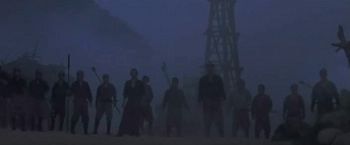
Remakes don’t have to suck. Admittedly, a lot of them do, but there’s a critical concept you might’ve heard of called Sturgeon’s Law, most commonly articulated as “ninety[-insert number here] percent of everything is crap.” If I may paraphrase the writer of more short stories than you or I will ever write and the original Star Trek episode “Amok Time,” remakes simply conform to the same trends of quality as all other art forms. It’s not pretty, but we live in a beautiful, ugly world, as the director of tonight’s film well knows. A world where genuinely good filmmakers with interesting, original visions have to churn out remakes before major studios risk financing anything original.
So 13 Assassins is a remake of a 1963 film of the same name, distributed by the house Godzilla built, Toho. It’s made by people who got famous riding the international wave of love Japanese horror movies surfed into the New Millennium. It’s screenwriter, Daisuke Tengan, wrote The Eel, which is a fucked-up movie, and Audition, a movie scientifically designed to fuck you up. Director Takeshii Miike went on from Audtion to Ichi The Killer, the Dead or Alive trilogy. Neither one of them would be my first choice for a period piece samurai drama. Never mind a remake of one that already exists.
Yet that’s just what they made and, not only does it not suck, it’s actually one of the better remakes of 2010. Much was made of the Cohen’s True Grit, but did Rooster Cogburn and Mattie Ross ever once mow down a street full of samurai in their quest to bring Tom Chaney to justice? No. No they did not. Point goes to 13 Assassins.
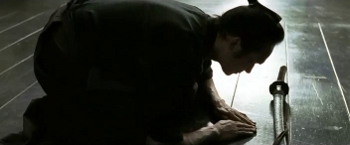
There are, however, parallels. As True Grit did with the American Western, 13 Assassins proves the Japanese Period Drama is alive and kicking in this otherwise-benighted twenty-first century. Despite the fact Miike would’ve been all of three when the original debuted, and Daisuke Tengan only a year older, it’s obvious both of them absorbed the basics of the jidaigeki genre at some point, even if only through osmosis. That’s no surprise, but the love behind it all? That hit me in the short-and-curlies by being so bloody obvious in every shot, from the color pallet to costumes to the camerawork. Even the trademark sick humor and outrageous inventiveness that made Miike an international sensation are turned to the service of paying homage and doing it with style. Hey, remember when movies had that?
As with any genre, jidaigeki comes with its own set of cliches, and I’d be lying if I didn’t say they’re all present and accounted for. With a cast this big, how could they not be? The Cruel Lord with his Endless Armies. The Novice who becomes a Killer. The Master and his Apprentice. The Low-Class Dude who joins the party to kick ass in the name of what we’d now call “the 99%.” The Former Allies who find themselves on Opposite Sides thanks to the Cruel Vicissitudes of Fate. It’s all here, and all animated by the cream of it’s generation’s acting crop, directed by a man who knows how to blend his style with genre expectation and create something that looks new, even if it isn’t.
Because 13 Assassins is, as the title should make obvious, a guys-on-a-mission movie set in Japan of the mid-1840s. Commodore Perry and his Black Fleet won’t arrive for another ten years and the Tokugawa shogunate is basking in (relative) peace and prosperity. The samurai – once mighty warlords in their own right – are now an anachronism in their own country, reduced to the role of glorified bodyguards. To politicians, no less.
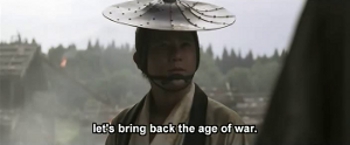
One such, Lord Naritsugu (Gorô Inagaki) is making a name for himself by torturing and mutilating peasants at his leisure. Given he’s the former shogun’s “adopted” (which, as in most countries, is Ruling Class Code for “bastard”) son and the current shogun’s younger brother, Naritsugu’s poised to join the shogun’s advisory council the next time he’s in the capital, spelling disaster for the nation. Ordered to deal with the situation “quietly” (ha! – Trust me, it’s funnier once you sit down for a second viewing) senior shogun adviser Sir Doi (Mikijiro Hira) has no choice but to put out a hit, hiring veteran samurai Shinzaemon Shimada (Kôji Yakusho) to make sure Lord Bastard’s next trip to Edo is his last.
The first act sees Shinzaemon put his titular team together in that true blue “putting-a-team-together” fashion familiar to anyone who saw Ocean’s Eleven. Or The Dirty Dozen. Or The Magnificent Seven. Or the Period Piece Drama that they both ripped off, Kurosawa’s Seven Samurai, one of the most innovative (and thus most ripped-off) movies ever made. The worldwide critical community can’t seem to decide which Kurosawa movie it likes more: Seven Samurai, or Rashomon. I’ve always been a Yojimbo or Ran kinda guy, myself…but there I go exercising Independent Thought again. No one ever got anywhere doing that, right, Edo Era Japan?
This doesn’t mean I don’t like Seven Samurai. There’d be no Yojimbo or Ran without it, and those two film justify its existence much better than I ever will, even with all the time in the world to write these reviews. Hell, modern Japanese movies as we now know them today are a testament to Seven Samurai‘s legacy. But all these “guys-on-a-mission” movies fall prey to size of the casts. As the number of principal characters increases, the time we get to spend with each of them will necessarily decrease…unless everyone wants to stark making three-plus hour epics. Even if they did, that would get old pretty fast. (See also Jackson, Peter and 2005’s King Kong remake…which, despite being too long and too sentimental, didn’t suck either.) But until someone invents a new technique of cinematic characterization, this trap will continue to snare unsuspecting movies of any genre. Even the most dedicated reviewers can only seem to pick out four or five of favorite characters from this one.
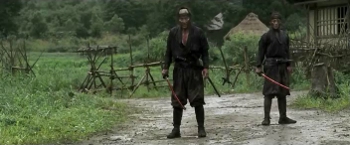
Mine are Shinzaemon, his student Hirayama (Tsuyoshi Ihara), Hirayama’s student, Ogura (Masataka Kubota) and Shinzaemon’s cynical nephew Shinrokuro (Takayuki Yamada). Here we have three generations worth of samurai, cut right out of legend, represented by four men who (to varying degrees) actually believe in the neo-Confucian underpinnings of their world. Shinzaemon even gets to explain it to us at the end so we’ll get it. Yes, everyone has a duty to perform, and the lower classes are duty-bound to obey their lords. But Lords, in turn, are duty bound to do the absolute best for their people. Should they do otherwise, the people are duty-bound to rise up and redress the balance of power, and thus the balance of the universe.
This is contrasted with Lord Naritsugu’s bodyguard, another old-school samurai and former sparing partner of Shinzeamon’s named Hanbei (Masachika Ichimura). “No matter how low I sink,” Hanbei explains to his old classmate, “I’m still a samurai,” because he’s destined to die defending his lord, as good samurai (supposedly) should. For Hanbei, it makes no difference whether his lord is an aspect of Buddha or a monster who walks like a man.
Thus adherence to the same basic bushido principals compel these two men to kill each other. 13 Assassins succeeds by doing what all good Period Pieces do, bravely positing that people in the past were different from us, with different belief systems that underpinned different thoughts. By contrast, Naritsugu’s murderous disdain for the lower classes is so downright modern I initially mistook him for a (by now) ol’ fashioned sociopath. I had to remind myself of the privileges due a shogun’s brother in 1844, which were functionally endless. Here’s a guy so insulated from life for so long, he mistakes the Climactic Battle for the greatest spectacle he’s ever seen. In the midst of this forty-five minutes of sword swinging and explosions, Naritsugu tells Hanbei his brilliant plan to bring back the age of Warring States, which the shogunate ended two hundred years prior by telling samurai, “You can keep your sword or your land, but not both.”
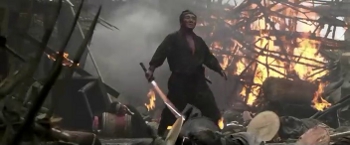
Irony being, the Age of Waring States returned less than ten years after the events of this narrative. Unlike last time, it was a global age, featuring threats no samurai – no matter how noble – could possibly face. Naritsugu may not survive to breed, but his children and grandchildren are going to survive politically by pushing his war-as-a-good-thing-in-itself-because-death-makes-life-worth-living philosophy on the rest of the country. Once secured, they’ll use the same tactic to justify all manner of imperial expansion projects, eventually kicking off World War II.
All this ran through my head during the forty-five minute Climactic Battle, an expertly staged and executed representation of chaos, organized by people who knew exactly what they were doing. This is the logical extension of Kill Bill Vol. 1, except Miike makes the tactful (and tactical) decision to shoot his action close enough for him to crop out most of severed limbs. Most of the time. There’s only one glorious fountain of blood in the movie – and that’s caused by an explosion and a Noble Sacrifice, both of which are equally glorious, so I’ll allow it. Otherwise, only unglamorous splashes mar the faces and clothing of Our Heroes as they literally make the streets run red.
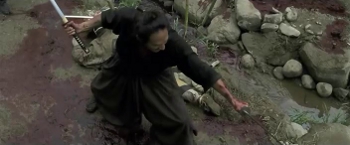
Miike’s name invariably draws attention to anything it’s attached to in the West, mostly from horror fans who bring a certain mindset with us. We go in waiting for Miike to spring one of his mousetraps on us, because Miike loves his hairpin tonal shifts, and we love him for loving them. He almost never makes us wait long without a purpose, and I was not kept waiting long. Or disappointed. Here I was, subconsciously comparing Miike to Kurosawa, and then, when I least suspected it, the movie tacked right into Boxing Helana territory. Just to establish the evil Lord Naritsugu’s is evil, what with his evil ways. But our hero, Shinzaemon, reacts to this evidence of evil with a samurai’s barely contained glee. He’s waiting all his life for a situation this black and white, and to die in it? What more could a warrior ask for?
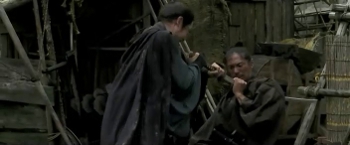
After that, my fellow horror fans may find themselves sitting through another hour and change of costume drama before “the good part” begins…but it’s well-paced costume drama, peppered with brief, to-the-point demonstrations of swordsmanship. Not the flashy, polite kind where everyone aims for everyone else’s blade – Miike stages the kind where you have to kick people off your sword or risk leaving at least half of it buried in their rib cage. That we see – but only once, when it can be a character-building moment for Ogura. As it should be.
Miike’s basic competence and (yes, I’ll even call it) artistic dency keep the predictable cliches of 13 Assassins (up to and including its plot) from triggering my usual blind rage and inarticulate ranting at the State of the Movies Today. I’ll swallow anything if the filmmakers find a way to pull it off without killing the pace of their story or hitting one of my No Buttons. Thirteen may be too many assassins for a two hour movie, but I’m tempted to let even that slide.
Because this isn’t about the characters so much as about the samurai as a class: how that class function in peace and in war time, and how it more-or-less killed itself with its own underlying logic. Either the samurai mutated into bandits, gangsters, or politicians (did I just say the same thing thrice?) or died for “a cause larger than themselves” – usually someone else’s political battle. In a surprising subtle (and therefore good) move, the fundamental contradictions of bushido that led to this are dramatized more often than they’re discussed. If/when this gets remade in English, expect long, drawn out discussions of honor to weight things down. It’ll be like a Fast and the Furious movie, but everyone will be wearing silk robes.
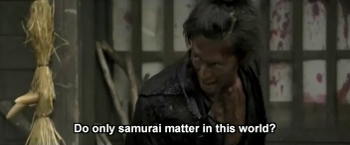
When samurai ideals are outright criticized, condemnations comes from the mouth of my other favorite character, Kiga (Yusuke Iseya), a hunter Shinzeamon’s band of twelve encounter on their way to ambush Naritsugu. Freed from the cage he’s been suspended in by his boss (for trying to make off with the bosses wife), Kiga becomes the thirteenth assassin. This itself is a cliche, echoing a similarly-lowly character from Seven Samurai who represented the nobility of commoners in an age when the nobility either ignored them…or used them for archery practice (as shown here). Because of that, Kiga’s character type is largely a twentieth century invention. Probably why Miike chose to (probably) make him a yokai, justifying his ability to hold his own with little more than a shit-eating grin, some rocks in slings, and a classical trained actor’s physicality.
Kiga won me over with all that, and by being genre-savvy enough to proclaim the samurai “useless..and even more useless in large numbers.” Out here we’ve come to call this the Law of Conservation of Ninjutsu, (“one Ninja is a deadly threat, but an army of them are cannon fodder”)…though in this case we should probably call it the Conservation of Bushido. “I thought you samurai would be fun,” Kiga says. “But you’re boring.” As if booby-trapping an entire small town weren’t exciting enough work. Kiga’s the timeless common man, and the closest thing we’ll get to an audience surrogate. Shinrokuro may be the one with the Token Girl (Kazue Fukiishi) waiting for him at home, but Kiga’s the one who knows samurai are no more than common men with a self-destructive code of honor.
That said, if your a connoisseur of fake violence, the self-destruction of the warrior class is always sweet to behold. Another old bit of conventional wisdom goes, “You can’t make an ‘anti-war’ movie because movies always make war look awesome.” The same could be said for samurai films, though at least this one tries to get us thinking. The one character who, like us, considers the Climactic Battle “magnificent” is Nartisugu – the guy who kills people as they console their recently raped (by guess who?) wives. Damnit, Miike – don’t you know modern villains are all supposed to be unsympathetic assholes? We aren’t supposed to share things with them…certainly not a love of carnage.
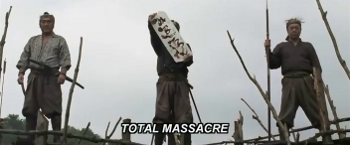
Yet the last forty minutes of this film are “magnificent” in the absurd level of carnage everyone managed to pull off. If the Street of Swords doesn’t make you smile – or laugh out loud in sheer appreciative joy, as I did – then the running of the Flaming CGI Bulls probably will. I’ll admit, that’s something I didn’t see coming. Kudos to you, 13 Assassins. You genuinely surprised me. I should’ve trusted you, because the people who made you are members of that great, endangered species of filmmakers who actually know how to make movies. Where your shittier directors shoot the action too close to cover their own shortcomings, Miike does it for the same reason he pulls the camera back to show you a panic-orama: because he has a point to make. Ten years on from Audition he’s still showing us horrors in unlikely places…like the faces of traditional heroes. Or beneath the surface of beloved genres.
If you have any hankering for a samurai movie, you should let 13 Assassins show you where the horror is, too. Even if you’ve struggled through the previous two thousand words of meandering gibberish without knowing what the hell I was talking about, this movie will still rock your socks off. It’s a little light on the characters, sure, and not morally ambiguous enough for some…but it tops off the tank by being broad in its stereotypes, light on the romanticism, heavy on the stage blood and long on the action.
Put it all together and you have the rare remake that doesn’t suck. Jumping Jesus, even Roger Ebert agrees with me. So either we’re both wrong…or I need to check to temperature in Hell. Because I know we’re right. So, like Shinzemon, I’ll see you there.
![]()
![]()
![]()
![]()

I exercise my independent thought by not liking Yojimbo and Ran, despite their generally accepted positions as great movies. I can’t really explain it, but I’ve been impervious to their charm, despite loving every other Kurasowa film I’ve seen except Throne of Blood.
Nice review-I really should watch this sometime.
Any way you slice it, I basically grew up on Yojimbo, since my parents were great fans of the Dollars Trilogy and history. These combined fandoms lead them back to Fistfull‘s antecedents and forward to its decedents, which they tirelessly collected. These turgid period dramas about manly men doing manly things as the world around them inexorably fades away were the movies we watched together as a family. Which probably explains a few key elements of my personality.
Either way, thank you. You should watch this at your earliest opportunity.
hi, mr. demoss–
i think you might be interested in the two stories contained herein about swordfight film actors and, in particular, one who specializes in dying:
http://actionfest.com/a-hero-dies-50000-times/
i love kurosawa. but i think it’s hard to appreciate films that changed everything after them, because, in retrospect, they end up looking like every other film that you probably saw before them.
it’s also interesting to me that something else that miike owes to kurosawa is the very carnage he presents. kurosawa created the graphicly violent “cruel films”/zenkoku eiga that lead right to miike’s work.
nice review and i really can’t recommend the original 13 Assassins enough. (also, Harakiri; Kill! (based on the same book as Sanjuro); and the harrowing, Revenge/Vengeance/Adauchi).
You’ve hit upon the retroactive familiarity problem I came across while researching the Superman review. While I can intellectually recognize influential movies when I see them/research them, I’ve given up looking for the transcendental emotional resonance I’m occasionally told I should feel. All I can do is honestly react to ’em as they come my way. And now, thanks to your recommendations, I have a perfectly good shortlist to work through.
it’s interesting that you bring up “transcendental emotional resonance” and being told you should feel it. you’re right, those “reviews” are everywhere, and are inherent in fan culture. and i think they are damaging, it’s part of why a movie can be “spoiled” or watched once and discarded, like a movie is something you can use up and you use to have some particular kind of emotional experience. i mean, even if you look at a movie like a thrill ride, people ride the same rollercoaster over and over.
i don’t want to sound like i don’t have emotional experiences in movies–No Country For Old Men is my current hallmark for “harrowing.” but i would never tell people to go see it to be harrowed–or to see Touch of Evil to feel just plain dirty. i think movies are also good to think about or appreciate aesthetically. i always get something more from a good movie, even if i don’t have that original, fresh experience. in fact, a really good movie is almost gets better the more i watch it.
Totally agree on all fronts, but especially with the fact that good movies get better the more times you watch them. Otherwise, there’d be no point in owning anything, never mind watching it more than once. And the best movies show you something new with every subsequent rewatch. I thought this was common knowledge, but I’ve come to realize it’s not so common. Possibly even less common than so-called “common sense.”
The problem, as I see it, is a shift in the audience’s relationship to art, which has become industrialized to an absurd degree. “Enjoyment” and/or “appreciation” (aesthetic or otherwise) have been replaced by a game of expectation-raising. From an industrial perspective, every movie has to be “The Greatest Damn Thing Ever Made!” because if it isn’t, no one will pay for it. We allegedly have so many “choices” in our “entertainment landscape”, and such short attention spans for things that don’t immediately relate to us, that hyperbole is only thing powerful enough to break through the invisible wall between movie studios and other people’s money (or so goes Marketing Logic).
Similarly, if critics in traditional media outlets want to keep their jobs, the best way to go is to stop being a critic and start being a “show-biz correspondent” with “access” to “the stars.” That means playing along with the Expectation Game, since no one talks to “critics” or “correspondents” unless they have something to sell. (And the people doing the interviews – up to and including the director – are really just front-line salespeople. Upper management talks to no one, lest we see the decrepit old men behind the curtain. Quick, everyone wave to Tom Rothman! You don’t have to use your whole hand.) Even the traditional media critics I respect have to waste time doing these puff-pieces – which rarely rise to the level The Tonight Show. All of which reinforces the idea that celebrities are more important than the things they do…the artistic works they participate in that supposedly make them famous. After all, celebrities have money. And money is The Highest Good in any industry.
The end result? No one in the “film” industry has any incentive to honestly discuss film, either as a whole or as the latest in the endless parade of Events. Instead, everyone treats movies the way tech companies treat computer equipment, complete with planned obsolescence. No wonder audience attitudes have started to reflect all this. At this point, it’s been going on for close to thirty years. An entire generation of film fans (including Yours Truly) have grown up basting in this crap-cloud. The “product” supposedly serviced by its unwieldy PR edifice has become an appendix…though (as John Carter‘s people will probably tell you if you get them alone for five minutes) not quite so easily cut out. At least not yet.
I worry, though, that as corporations grow more desperate for the shortest of short-term gains (symptomatic of a broader, worldwide move towards a bullshit- and fraud-based economy), movies will continue to become theme park rides and micro-Disneylands will sprout from malls across the continent, like an especially ugly type of fungus. Except for those malls that’re part-owned by Warner Brothers, of course. They’ll morph into mini-Six Flags.
Slow clap.
I know there’s a lot of people that hate on the hate for spoilers, and I appreciate some people aren’t bothered by knowing what’s going to happen in a movie (my own dear brother, perfect example) but I think you can appreciate movies in the long view AND enjoy going in to your first viewing with as little info as possible. I enjoy the surprise the first time around; subsequent viewings can give me the chance to evaluate it without that element of surprise, but I’m never getting that surprise back.
Sounds like a good flick, this is going on my list along with The Raid.
Hope you enjoy it as much as I did…or even a tenth as much. They do, on occasion, still make ’em like they used to…at least in Japan.
if you liked this flick you’ll LOVE this one:
http://www.imdb.com/title/tt0901487/
as self-conscious homages to BOTH Kurasawa and Leone go, it’s the BEST.